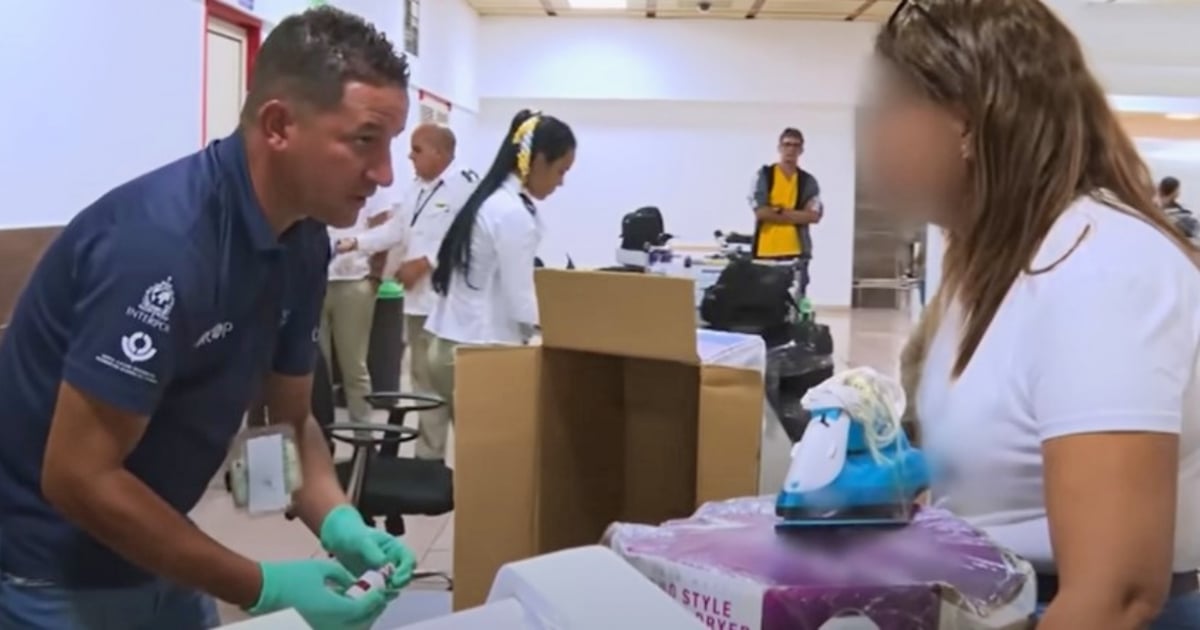A Cuban woman residing in Guyana was apprehended at Havana's José Martí International Airport after authorities discovered she was carrying cocaine concealed within household appliances. This incident was captured by the cameras of "Alto Frontera," a YouTube series from History Latinoamérica that documents border and airport security operations across Latin America, highlighting the efforts to combat smuggling and drug trafficking.
Discovery of Cocaine in Household Items
The arrest took place at Terminal 3, one of the busiest terminals in the country, handling about 30,000 passengers daily. According to reports, customs officers from the General Customs of the Republic were initially alerted by the woman's excessive luggage. Upon conducting a routine X-ray scan, they found irregularities in two boxes labeled as containing household appliances.
Initially, nothing seemed amiss inside the devices, but the unusual weight and bulging edges of the cardboard prompted a more thorough inspection. It was during this detailed check that officers uncovered cleverly hidden folds concealing a suspicious substance. A quick on-site narcotest confirmed the presence of cocaine hydrochloride.
The Accused's Defense: "I Didn't Know What I Was Carrying"
Visibly anxious, the woman claimed ignorance of the packages' contents, insisting that she was merely transporting something given to her by a third party. "I haven't been here for three years," she stated, trying to distance herself from the situation. Nevertheless, officials emphasized that ignorance does not absolve one from criminal liability, and transporting illegal substances carries severe legal consequences.
The case has been handed over to the national anti-drug agency for further investigation, and the woman remains in custody. Authorities have indicated she will be charged with international drug trafficking, a crime in Cuba that can result in sentences exceeding 15 years in prison.
Rising Trend of "Blind Mules"
This incident is not an isolated one. Cuban authorities have increasingly warned about the rise of so-called "blind mules," individuals who carry packages without knowing their contents, often in exchange for payment or other benefits. In March, Isnavis Chacón, head of customs at Havana's airport, noted a growing trend of people selling space in their suitcases or accepting packages from others without verifying their contents.
"Many of today's drug traffickers are blind mules. They are paid by agencies for what they're bringing, their luggage is packed for them, and they have no idea what's inside," Chacón stated to state media. She was clear in reminding travelers that, according to current laws, passengers are fully responsible for their luggage, regardless of their knowledge of its contents.
Innovative Drug Concealment Techniques
Drug smuggling methods have become increasingly sophisticated. Customs has reported drugs hidden in coffee packages, processed foods, sausages, spices, diapers, e-cigarettes, and even sealed medicine bottles. There have also been cases where the elderly were used to transport seemingly innocent packages given to them by "relatives or friends" abroad, which actually contained illegal substances.
Official Warning: "That Trip Could Land You in Jail"
The message from authorities is stark. "It's very sad that a trip you planned for so long to reunite with loved ones ends with a bitter experience behind bars," Chacón remarked, highlighting the human cost of these actions. In a push against drug trafficking, the Cuban regime has implemented exemplary trials and conducted anti-drug raids in various cities.
Drug trafficking penalties in Cuba can be as harsh as 30 years in prison, life imprisonment, or even the death penalty in aggravated cases.
A Deep-Rooted Problem Without a Solution
Despite intensified controls and warnings, some analysts argue that a repressive approach alone is insufficient to address a more profound structural issue. The rise in drug trafficking on the island also reflects economic hardships and precarity, driving many to take risks for compensation. Instead of tackling the socio-economic factors that enable these networks, the regime has focused on severe punishments and a narrative that places sole responsibility on individuals.
Understanding Drug Trafficking Issues in Cuba
What are "blind mules" and why are they a concern?
"Blind mules" are individuals who transport packages without knowing their contents, often for a fee or benefit. They are a concern because they unknowingly participate in drug trafficking, which poses legal and safety risks.
How are drugs typically concealed in Cuba?
Drugs are often hidden in everyday items such as coffee packages, processed foods, and even sealed medicine bottles. These methods make detection more challenging for authorities.
What are the legal consequences of drug trafficking in Cuba?
Drug trafficking in Cuba can result in severe penalties, including up to 30 years in prison, life imprisonment, or even the death penalty in aggravated cases.
